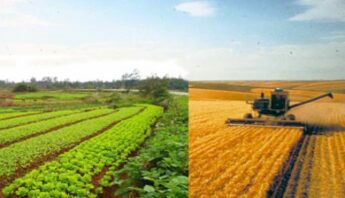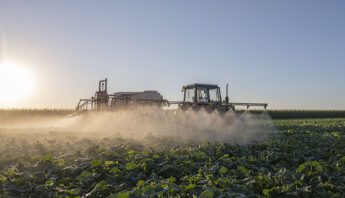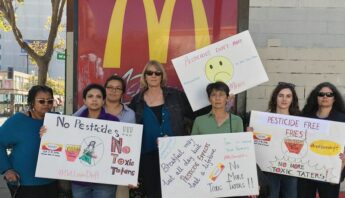It’s the only explanation. Historically, Scientific American has been unafraid to confront right-wing attacks on science of the climate change denier and creationist sort. So when a blog appears under the SciAm masthead claiming to “bust" various myths of organics, citing industry-funded studies and commentary from fringe right-wingers like Alex Avery of the Hudson Institute, one wonders what happened.
Christie Wilcox’s “Myth-busting 101: Organic Farming > Conventional Agriculture,” published last week, has already elicited rebuttals from food and ag writers at Mother Jones, Grist and more. As Mother Jones’ Tom Philpott notes, the piece is so predictable in its rehearsal of industry talking points as to warrant a big yawn. But it’s in SciAm and will no doubt serve as link bait in the ongoing debate over the future of global food and agriculture; so we find that a few basic corrections are in order.
First, the “myths” Wilcox claims to bust: 1) Organics don’t use pesticides; 2) Organic foods are healthier; 3) Organic farming is better for the environment; and 4) It’s all or nothing. Let's take each in turn.
Correction #1: The realities of pesticide use.
Claim: Organic farmers use pesticides, often more intensively than do conventional farmers. Her words: “shockingly, the actual volume usage of pesticides on organic farms is not recorded by the government. Why the government isn’t keeping watch on organic pesticide and fungicide use is a damn good question, especially considering that many organic pesticides that are also used by conventional farmers are used more intensively than synthetic ones due to their lower levels of effectiveness.”
Facts:
- Definition of a pesticide: Pesticide is a functional description – any substance that kills a pest (insect, weed, rodent, fungus) is a pesticide. Mustard can be used to fumigate soil prior to planting, and salt to kill bugs: in these instances they would be considered pesticides. In most cases pesticides used in organic farming are less toxic and less persistent, in no small part because they aren't petrochemically derived.
- Use data: Pesticide use data is not kept in the U.S., period. (See Karl Tupper's recent "flying blind" post). Our national pesticide law, FIFRA, expressly forbids EPA from requiring applicators to report use (section 11(d)), so the only data we have are at the aggregate level and California’s use data. Had Wilcox looked at actual national use data (inadequate though it is) she would have found that the overwhelming majority of agricultural pesticide use in the U.S. consists of two herbicides that are not allowed in organic production: glyphosate (active ingredient of Roundup) at 180-185 million pounds, and atrazine at 73-78 million pounds in 2007. Both are endocrine disruptors linked to birth defects and a host of environmental harms including, in the case of atrazine, the “chemical castration” of frogs. Not incidentally, glyphosate use (as well as aggregate herbicide use) has increased in step with the commercialization of non-organic genetically engineered RoundupReady crops.
- Residue data: USDA keeps residue data which we sort and cross-reference with toxicity data (because not all pesticides are created equal) in PAN’s online tool, WhatsOnMyFood.org. There Wilcox would have found that in almost every instance where statistically significant residue data is available, organic food has negligible pesticide residues, if any.
- Net effectiveness: Wilcox cites a study from the University of Guelph (of the now-famous faulty clothianidin study) on the question of whether organic-certified pesticides work well enough to have a smaller net environmental footprint. In the 5 years leading up publication of this study, the research team received funding from a number of (conventional) growers groups, Bayer CropScience (maker of clothianidin), Monsanto, Dow AgroSciences, Syngenta, BASF, and DuPont (a.k.a. the “Big Six”). No independent studies that we know of have proven that organic-certified pesticides are "more ecologically damaging" than synthetics.
Wilcox does make a number of valid points: natural does not mean safe, for instance. But the fundamental assertion of this first myth-busting exercise — that organics use pesticides that are as dangerous and damaging as the synthetics used by conventional agriculture — is simply not borne out by the facts.
Perhaps the next time a consumer is contacted by a pollster on this topic, they/we should more properly say, “I buy organics because they don’t use the kinds of pesticides that create public and environmental health hazards, harm pollinators and other indicator species, make farmers and farmworkers sick, and/or persist for years in the environment accumulating up the food chain.” Noted.
Correction #2: The nutrition science is still coming in.
Claim: “Science simply cannot find any evidence that organic foods are in any way healthier than non-organic ones — and scientists have been comparing the two for over 50 years.”
Fact:
- State of the evidence: The science on the nutritional value of organic is contested and evolving. The Organic Center responds to the study Wilcox cites here. Takeaway: the study she points to uses old science that fundamentally confounds their results. For instance, studies prior to 1980 didn’t have the analytical techniques needed to report total phenolics or antioxidant capacity (since these nutrients were just being discovered). And since 2008, more than 15 new studies have been published, most using better design and analytical methods based on criticisms of older studies.
In sum, the nutritional superiority of organics is not at all established, but neither is it a myth.
Correction #3: Organic farming is better for the environment. Period.
Claim: "People seem to believe they’re doing the world a favor by eating organic. The simple fact is that they’re not — at least the issue is not that cut and dry…. Organic farms use their own barrage of chemicals that are still ecologically damaging, and refuse to endorse technologies that might reduce or eliminate the use of these all together. Take, for example, organic farming’s adamant stance against genetically modified organisms (GMOs). GMOs have the potential to up crop yields, increase nutritious value, and generally improve farming practices while reducing synthetic chemical use."
Facts:
- Broken promises of biotech: 14 years of commercialization and billions of dollars in publicly funded research and we still have yet to see a GM crop that increases yields, nutritional value or improves farming practices. Neither do these technologies "reduce or eliminate the use of [pesticides] all together." In fact, they increase herbicide use precisely because that’s what most of them are engineered to do.
- Water use & biodiversity: Conventional (i.e. industrial) agriculture uses 70% of the Earth's fresh water resources and is a (by many measures, the) primary driver of the biodiversity collapse that 7 in 10 biologists believe poses an even greater threat to humanity than climate change. By contrast, organic farming systems (the agroecological kind) are dramatically more efficient in their use of water and protect biodiversity.
- Climate change: Agriculture is the largest single-sector driver of greenhouse gas emissions — mainly methane from livestock and nitrogen pollution from synthetic fertilizers. Organic farming systems do not use synthetic nitrogen fertilizer, they address soil fertility through cultural practices such as cover-cropping, and in the process mitigate against climate change by cultivating richer soil that serves as a carbon sink.
Yes Virginia, synthetic pesticides really are bad for the environment.
Correction #4: Organics are not trying to take over the world.
Claim: "As far as I’m concerned, the biggest myth when it comes to organic farming is that you have to choose sides."
This claim is true enough, in the abstract. The main issue is that nobody believes this myth, it's a version of the "we need all the tools in the toolbox" talking point that conventional ag proponents use in defending the status quo. It also ignores drift and the capture of food and farm policy by big agribusiness and the pesticide industry.
Facts:
- Pesticides & GMOs drift: Pesticide drift is a serious problem for organic farmers, as is GMO contamination. Farmers lose their certification and with it tens of thousands of dollars in market value for the crops that they paid more to produce without synthetic chemicals. PAN is working with partners to institute a drift liability provision so that organic farmers can recoup lost profits when their crops are contaminated by GMOs and pesticide drift. The idea of pesticide and biotech corporations being held liable for damages caused by their products is apparently quite scandalous, but without this basic legal protection the "can't we all just get along" proposal is disengenuous, at best. In practice it means that organic farmers need to stay out of the way.
- Policy capture: 98% of the USDA’s ag research budget goes to conventional and less than 2% to organic farming systems. Agricultural research and trade policy are written and implemented by former pesticide industry lobbyists (Islam Siddiqui, USTR), and Monsanto employees (Michael Taylor, USDA and Roger Beachy, NIFA). The Farm Lobby has held such impenetrable influence over Congress for so long that political scientists use the conventional ag "sub-government" as a case study in undue influence.
One doesn't have to declare allegiance to organic farming to see that a transparent re-evaluation of public policy priorities is long over-due and more a matter of democratic governance than politial loyalties.
The "feeding the world" issue
While the issue of whether or not organics can feed the world is not among Wilcox's myths, she was compelled to respond to commenters with this note:
while I’m adding in notes: stop citing Bedgley [sp] et al. 2007 as evidence that organic farming produces equal yields: this study has been shown to be REALLY BADLY flawed, and was generally torn apart (e.g. this response article)
The Badgley article in question has not, in fact, been generally torn apart — least of all by the Alex Avery commentary to which Wilcox points. Badgley responded here to Avery's points with more depth and care than was likely deserved.
A few words here on Avery, since we haven't seen it covered elsewhere yet. Alex Avery is the loyal son of Dennis Avery, the author of Saving the Planet With Pesticides and Plastic (Hudson Institute, 1995), and a vociferous climate change denier.
The Avery's work together at the Hudson Institute, which is a fringe think tank with deep corporate ties. The roster of companies that have supported its work includes: Monsanto, Du Pont, DowElanco, Sandoz and Ciba-Geigy, and agribusiness giants ConAgra, Cargill and Procter & Gamble.
Note to SciAm editors: the next time a blog or article reads like an industry hit piece, dig a little deeper into the sources.







